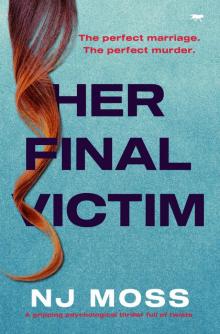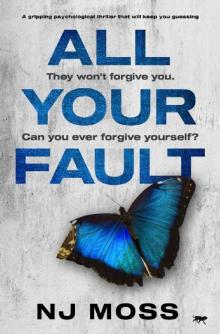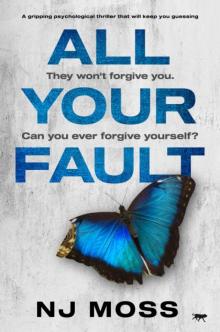All Your Fault Read online
All Your Fault
NJ Moss
Copyright © 2021 NJ Moss
The right of NJ Moss to be identified as the Author of the Work has been asserted by him in accordance to the Copyright, Designs and Patents Act 1988.
First published in 2021 by Bloodhound Books
Apart from any use permitted under UK copyright law, this publication may only be reproduced, stored, or transmitted, in any form, or by any means, with prior permission in writing of the publisher or, in the case of reprographic production, in accordance with the terms of licences issued by the Copyright Licensing Agency.
All characters in this publication are fictitious and any resemblance to real persons, living or dead, is purely coincidental.
www.bloodhoundbooks.com
Print ISBN 978-1-913942-80-9
Contents
Love best-selling fiction?
Chapter 1
Chapter 2
Chapter 3
Chapter 4
Chapter 5
Chapter 6
Chapter 7
Chapter 8
Chapter 9
Chapter 10
Chapter 11
Chapter 12
Chapter 13
Chapter 14
Chapter 15
Chapter 16
Chapter 17
Chapter 18
Chapter 19
Chapter 20
Chapter 21
Chapter 22
Chapter 23
Chapter 24
Chapter 25
Chapter 26
Chapter 27
Chapter 28
Chapter 29
Chapter 30
Chapter 31
Chapter 32
Chapter 33
Chapter 34
Chapter 35
Chapter 36
Chapter 37
Chapter 38
Chapter 39
Chapter 40
Chapter 41
Chapter 42
Chapter 43
Chapter 44
Chapter 45
Chapter 46
Chapter 47
Chapter 48
Chapter 49
Chapter 50
Chapter 51
Chapter 52
Chapter 53
Chapter 54
Chapter 55
Chapter 56
Chapter 57
Chapter 58
Chapter 59
Chapter 60
Chapter 61
Chapter 62
Acknowledgements
A note from the publisher
Love best-selling fiction?
You will also enjoy:
Love best-selling fiction?
Sign up today to be the first to hear about new releases and exclusive offers, including free and discounted ebooks!
Why not like us or follow us on social media to stay up to date with the latest news from your favourite authors?
For my wife, Krystle
And for my mum, Betsy
1
It was supposed to be sunny when my little sister died. The weather forecast had promised a clear blue sky and a pleasant late-summer evening. But then deep grey clouds had suddenly appeared, and rain slashed down with a vengeance.
Mother and Father had bought Hope a bike for her birthday. Hot pink, it looked like it’d been transported out of a 1950s American catalogue, with tassels on the handlebars and a white wicker basket on the front. Mother had asked me to take her out, since I was thirteen and needed to start adopting some responsibility.
I’d heard them discussing it, Mother with her dignified voice pitched low. “When I was half her age I was self-sufficient, Nick,” she said, as I pressed my ear against the dining room door and tried to be as silent as Hope would soon be. “She must learn. They both must. It will be good for Hope to be able to trust her big sister, to feel she can rely upon her if, God forbid, something were to happen to us.”
Mother had been raised by a schizophrenic woman who’d taken her own life in one of the most gruesome ways imaginable; she’d slit her throat and then hanged herself for good measure. Mother had seen a glimpse of her dangling body, I knew. And to make matters even more evil, her father had sometimes amused himself by toying with his sick wife’s psychosis. He’d created phantoms that weren’t there. He’d told her to wake up when she was already awake. He’d punished her for not being the wife he thought he deserved.
I learnt all of this later. But it was this reasoning that led Mother to believe it would be a good idea for me to take care of Hope. We were supposed to bond as sisters. I was supposed to become mature and reliable.
Hope was definitely not supposed to die.
My little sister was like an ambassador for heaven, a perfect girl, her deep oaken hair worn in a long braid down her back, somehow full of vitality even as it drooped in the downpour. She was fond of finding pebbles and small rocks on the beach at Weston-super-Mare, a short drive from Bristol where we lived. She had Father drill holes in them and made necklaces and bracelets and decorations.
She was wearing a small rock-seashell bracelet, her summer dress sticking to her bird-thin body, a body that would have no chance against a speeding bullet of a car. Her dress had little rabbits on it.
Her smile didn’t break as we trudged up Clifton Hill. I had no clue that in a matter of minutes she would be lying in a puddle of rain and blood. “It’s not too bad.” She pushed her bike steadily. “It’s kind of nice. It’s fun.” She raised her voice over the cacophonous rainfall. “Grace, I said it’s kind of nice!”
“I heard you.” I laughed, shaking my head and sending droplets scurrying. It was difficult to believe how optimistic she was. She didn’t even care I’d dragged her halfway across the city so I could see a boy. “I’m pretty fucking miserable though.”
She tutted. “Don’t curse, Grace.”
I held my hands up in defeat. “You sound like Mum.”
It was Mum then. She had yet to take on the steely Mother.
We crested the toughest part of the hill and the rain got worse. But it was only a short way. Soon we’d be warm and safe at home. I had a mobile – a big chunky Nokia – but the battery was dead. Then Hope stopped and turned her bike back toward the direction of the decline.
“Why’ve you stopped, you little pest?”
“I really think I could.” She was moving the bike back and forth as though winding up for something.
“Could what?” I yelled over the rain.
“This hill,” she yelled back. “I really think I could, you know. I’m getting good.”
“Could what?”
“Ride all the way to the bottom. It’d be so fun, wouldn’t it?” I could read the adventurous glint in her eyes, the invincible force of her smile. She’d clearly been imagining this for some time.
“We should go home. You can kill yourself another time.” What an unfair choice of words; what a horrid memory to have implanted in my mind. “Mum’s going to be worried sick.”
“I really think I could, Grace. I really do.”
“Another time—”
“It won’t take long.”
“Another time—”
“I can do it.”
“Another time. It’s raining.”
“Don’t be a spoilsport.”
She moved so fast, the speed of a precocious girl who might’ve grown up to be a scientist or a champion skier or a fashion designer or anything she wanted. She was brave and never flinched in the face of rain or hills or danger.
She climbed onto the bike and ducked her head and her braid waved behind her, and she crested the lip of the hill and surged back the way we’d come.
I screamed and ran down the hill, tripping and catching
myself, panting for breath. Rainwater soaked me and my feet were cold, and then I finally found her, my courageous little sister. Her bike was crumpled like paper and looked tragic in the rain. One wheel was imploded and the other was spinning around and around and around.
2
I felt as if I’d climbed from a memory hole as I stared into the faces of the book club.
There was Yasmin Shenton, a woman with dyed pink hair and a punkish attitude who I’d met through the riding society at Bristol University. Then there was Margaret Basset and Sarah Jenkins, the former a dignified older lady with a dignified bearing and a dignified way of sipping her rosé, the latter a stocky short-haired woman with a penchant for fiddling with her glasses and arguing about politics after a few beers.
It was Mike Foreman, the only man in the group, who leaned forward and nodded slowly. “It’s good to draw on your personal experiences.”
I exchanged a look with Yasmin, my oldest true friend, though we were both so busy these days that our university closeness was difficult to maintain. It had ridden off with our penchant for horseback riding. Now we were mothers, wives. Men, her look said.
Mike was sinewy and wore a baggy black hoodie and faded blue jeans. He had a devilish look in his eyes. I was often surprised he had decided to attend a book club. “It’s really helped me connect to the way Esther feels in this scene.”
We were discussing Sylvia Plath’s The Bell Jar – Yasmin’s choice – and I’d offered up my final evening with Hope as a talking point, something I found myself doing from time to time, as if by discussing it I could diffuse its messiness.
“Yes, well,” I said non-committally, moving my finger around the rim of my wine glass. The pub was dusky with the setting September sun. The bell was yet to be rung for last orders, but already it was quiet, the music playing low, the rain tapping lightly against the window.
It’s like Hope is clawing her fingernails against the glass.
There it came again: my unhelpful habit for unhealthy thoughts.
“I really oughtn’t to have mentioned it. But I suppose I can connect with her character easier than I might like to.” I found myself wringing the paperback as though I was punishing it. Matters were not helped by it being the anniversary of Hope’s death, my innocent little sister. Mother’s face flashed across my mind in a jagged vignette.
“It makes sense,” Yasmin said, after a pause.
“Hear hear,” Margaret concurred, gesticulating as though she wished she held a gavel.
“Are you okay?” Sarah asked.
“Yes.” I laughed, harder than I intended. “I’m sure the last thing you need on a Sunday evening is for me to utterly depress you.”
“Don’t be stupid.” Yasmin shook her head. “You haven’t upset anyone.”
Except maybe myself. I grabbed my wine glass and knocked it back, finishing off the tiniest of sips, and then turned to Mike. “What did you think anyway?” It was his turn.
He nodded slowly with his characteristic smirk. When he’d first started, I’d been convinced he was here as a ploy to meet women. But he’d never made a pass at any of us, even tattooed wild-looking Yasmin… and never mind that her surface wildness hid a hard-working accountant and loyal wife and mother. He hadn’t known that at the time.
“I think death is a complicated thing, I guess.” Mike shrugged. “I think it’s hard to know if we’ve done the right thing, in life or in death, you know?” He chuckled. “I also think I’d like another bloody pint before things get too serious.”
“Sounds perfect,” Sarah said. “Cider and black?”
“You read my mind.”
Yasmin reached across the table and took my hand, giving it a squeeze. I met her eyes and we both smiled. I remembered eleven years ago, how tall and majestic we were on horseback. It seemed like a hundred years ago, a thousand. I felt like a different woman. I was a different woman.
“Are you having another, Grace?” Sarah asked me.
“No. I’m driving. Thank you.”
Had Hope’s killer been drunk the evening he ran her down?
I’d never know.
He’d hit, and then he’d run. Even calling the killer he was pure sexism on my part. The killer was a shadow, a faceless driver, a lost car slicing through our lives and leaving cataclysm in its wake.
3
I drove from the pub in the city centre toward Filton, to our three-bedroom semi we were just about holding on to. With Troy’s job as a manager at an insurance company, along with my occasional sprees of part-time work – receptionist, office temp, retail work, things Mother would always tip her nose up at, as though her daughter was above such things – we were managing to balance the difficult juggling act of modern life.
I was eager for this day to be over, for Hope’s death to be another year behind me. Even if it was cruel – and it was cruel – I longed for the day when I could forget it completely. It haunted me. The guilt gnawed. I knew the chances of me overcoming the grief were slim, and if I thought overly long about it I might go the same way as Cecilia Hyde, my grandmother.
I shook my head, squeezing the steering wheel, telling myself I was being foolish. I was not, nor had I ever been, what could be characterised as mad. Nor would I become so. At thirty, I had passed the threshold for the risk of schizophrenia. It was most likely to strike in your twenties or late teens.
What about Mia? What about Russ?
I went inside and found Troy in the living room, sitting in his writer’s cubby. A Lord of the Rings poster hung on the wall above his desk and a few action figures – no, collectibles – stood sentinel around his laptop. As my husband spun in the office chair and smiled up at me, I saw the gaunt man he’d been at university, as though he could survive on passion alone. He’d had an almost rakish appearance then. Now, just as I had, he’d filled into his body, a few lines around his eyes that hinted at what would come in another decade.
I felt a wave of love crash over me, so glad to be home. I slid into his lap and wrapped my arms around his shoulders.
“Woah.” He laughed. “What’s this for?”
“What?” I wriggled against him, feeling his desire flame. “I can’t be happy to see my husband? Are the children in bed?”
Troy smiled, his goatee shifting with his lips, stroking his hand up and down my thigh. “Just about. Russ was really good tonight, built a bridge out of Lego. I swear to God, Grace, the kid’s gonna be an architect when he grows up.”
A glow infused me, even as the elephant in the room tried to stampede over the moment. I could see the Word document open on Troy’s laptop; the word count was only one hundred more than when I’d left. I knew it was several hundred shy of his goal for the night.
“How did it go this evening?” I asked.
“It’s getting there.”
Troy had had a few short stories published in online magazines, but his big dream was to get a novel published set in his fantasy world, the same world all his stories were set in. His Twitter bio advertised this fact. He often said all he needed was a chance, one shot, and he’d shock the world.
“I know it’s going to be amazing.” I kissed his bristly-bearded mouth. “Just like you.”
“Somebody’s feeling frisky tonight.”
“Frisky?” I giggled. “I was about to offer you-know-what, but now I think I may be sick instead.” He made to tickle me and I leapt up, a pre-emptive defence. “I’m going to check on the little ones. Then maybe…”
He jumped to his feet and leaned forward, kissing me harder. “Forget maybe. See you in three. I’ll put on my best lingerie. I’m feeling frisky.”
“I’m not listening.” I laughed as I strode from the room.
I went upstairs and poked my head into Russ’s room. My son was shrouded in his blanket, curled on his side with a content smile on his face. The only time he wasn’t moving was when he was sleeping. I walked across the room and kissed him on the forehead. “I love you, little man.”
&nb
sp; I went into Mia’s room. While Russ’s was a war zone of Legos and toys and five-year-old detritus – despite our efforts to the contrary – Mia’s was a little lady’s boudoir. Her art supplies sat neatly on her desk, and her walls were decorated with all the drawings and paintings she’d done since she was three, the quality changing from crude stickmen to stunningly precise pencil sketches and flourishes of vivid paint that held personality in each brushstroke. She had real talent. Pride swelled in me every time I looked at her work.
There was only one that didn’t fit: a big A3-sized piece of a woman sitting in the middle of what appeared to be a collapsing star, her dress torn and tattered, but thankfully covering her private areas. Everything about it hinted at a terrorised spirit, which was fitting; it had belonged to my grandmother. Mother had given it as a gift, and I’d felt awkward telling her no.
Mia had her back to me, snoring softly. For the briefest moment as I gazed across the room, illumed only by the lamp posts and the moonlight against the curtains, I saw Hope. Hope at ten years old, three older than she’d ever be. Sleeping peacefully.

 Her Final Victim
Her Final Victim All Your Fault: a gripping psychological thriller that will keep you guessing
All Your Fault: a gripping psychological thriller that will keep you guessing All Your Fault
All Your Fault